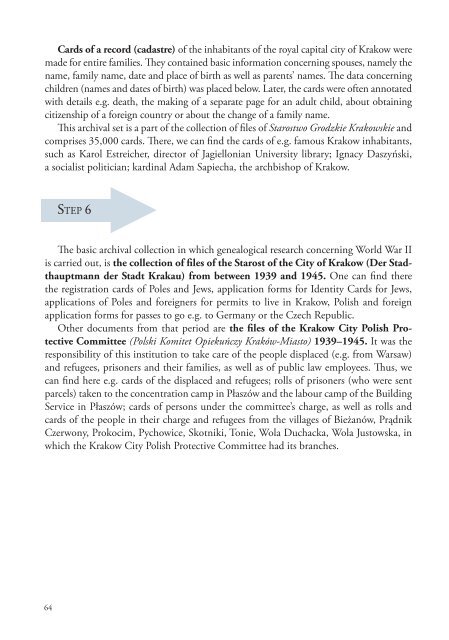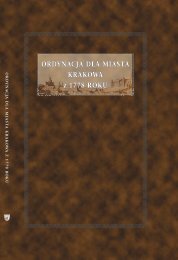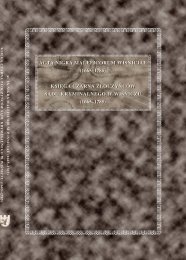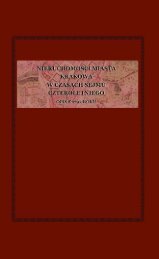W poSzuKiWaniu przodKóW - Fidkar
W poSzuKiWaniu przodKóW - Fidkar
W poSzuKiWaniu przodKóW - Fidkar
Create successful ePaper yourself
Turn your PDF publications into a flip-book with our unique Google optimized e-Paper software.
Cards of a record (cadastre) of the inhabitants of the royal capital city of Krakow weremade for entire families. They contained basic information concerning spouses, namely thename, family name, date and place of birth as well as parents’ names. The data concerningchildren (names and dates of birth) was placed below. Later, the cards were often annotatedwith details e.g. death, the making of a separate page for an adult child, about obtainingcitizenship of a foreign country or about the change of a family name.This archival set is a part of the collection of files of Starostwo Grodzkie Krakowskie andcomprises 35,000 cards. There, we can find the cards of e.g. famous Krakow inhabitants,such as Karol Estreicher, director of Jagiellonian University library; Ignacy Daszyński,a socialist politician; kardinal Adam Sapiecha, the archbishop of Krakow.Step 6The basic archival collection in which genealogical research concerning World War IIis carried out, is the collection of files of the Starost of the City of Krakow (Der Stadthauptmannder Stadt Krakau) from between 1939 and 1945. One can find therethe registration cards of Poles and Jews, application forms for Identity Cards for Jews,applications of Poles and foreigners for permits to live in Krakow, Polish and foreignapplication forms for passes to go e.g. to Germany or the Czech Republic.Other documents from that period are the files of the Krakow City Polish ProtectiveCommittee (Polski Komitet Opiekuńczy Kraków-Miasto) 1939–1945. It was theresponsibility of this institution to take care of the people displaced (e.g. from Warsaw)and refugees, prisoners and their families, as well as of public law employees. Thus, wecan find here e.g. cards of the displaced and refugees; rolls of prisoners (who were sentparcels) taken to the concentration camp in Płaszów and the labour camp of the BuildingService in Płaszów; cards of persons under the committee’s charge, as well as rolls andcards of the people in their charge and refugees from the villages of Bieżanów, PrądnikCzerwony, Prokocim, Pychowice, Skotniki, Tonie, Wola Duchacka, Wola Justowska, inwhich the Krakow City Polish Protective Committee had its branches.64






